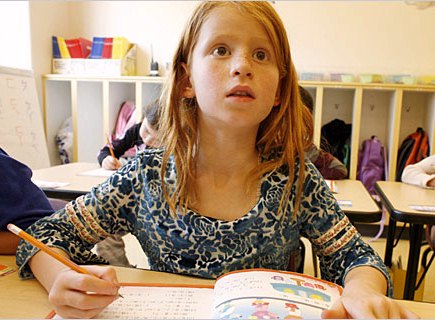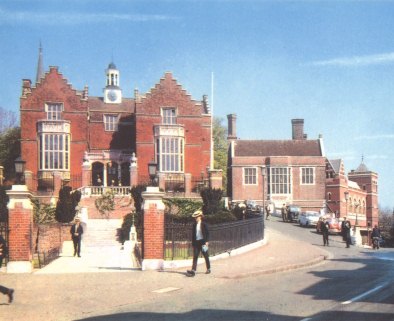|
|
|||||||||||||||||||||||||||||||
|
Privatization in Sweden's Education System
The Impact of Privatization on Sweden’s Education System
Sweden has undergone a number of changes since it first joined the E.U. in 1995. Recent policy changes is slowly shaping the nation, making it look more and more like Western nations that embrace “Americanization.” Sweden is losing its social democratic aspects that once placed it on the world pedestal of social democracies. Unfortunately, its alignment with the E.U. and the global economic restructuring that is currently taking place is having adverse effects on the Swedish school system and its students. By analyzing the changes made to Sweden’s education system we can track neo-liberalism’s level of growth in the country. By Nelly Pouragheli - 2008. Sweden’s education model used to be the hallmark of quality and democratic education. It used to be Sweden’s education model that other Western countries held in high regard and attempted to duplicate. This is no longer the case. The state of the Swedish educational system began to change and ultimately crumble after the 1970s. There are clear signs that a quality social democratic education in Sweden is under threat. The belief used to be that a true democracy can only be engendered when there is a system that promotes quality education and equal opportunity for all its citizens. Sweden’s education system has fallen victim to neo-liberal globalization (a.k.a Milton Friedman’s ideas). Through globalization, a shift to the political right in the most powerful nations, and Sweden’s alignment with the European Union, Freidman’s ideas have spread across the developed world and are now beginning to show their impacts in the Swedish education system.
Freidman has not only heavily influenced American society and American politics but his ideas are being embraced by politicians around the globe. So what exactly does he stand for? The answer is individual rights. All of his arguments are embedded in the notion that the individual and individual rights should reign over all other rights and that the state should only play the role of ensuring the rule of law and fostering competitive markets. Essentially, Freidman believes in the liberalisation of markets, privatization, deregulation, small governments and the dispersion of power to different levels of government, competition and individual freedom. Friedman and his proponents believe that individuals should have the right to “choose” and be increasingly responsible for providing for oneself and for one’s family. Thus, Friedman’s ideology, which has been embraced in the West, promotes individualism and more importantly, takes the collective good out of the discussion of what it means to be a civilized and democratic nation. His views are reflective of the extreme right and sadly his influence is visible, even in social democratic nations such as Sweden. Freidman’s ideas and those of neo-liberalism; are present in the opening statement of the Swedish 2007 budget, “Conditions for starting and running companies have improved for the country’s business operators. Wealth tax will be abolished, which will make it easier to find risk capital. Reductions in employers’ social security contributions have made it more profitable to run a company. Sweden’s entrepreneurs, investors and business operators are groundbreakers and innovators. They play a key role in steadily building a strongly placed economy in a changing world” (Sweden Budget 3). Indeed, this is reflective of the ideological change that Sweden is going through. It clearly illustrates the move of the Swedish Government towards a more market-driven state. For Sweden’s education system, this move has meant that the focus of education is shifting to strengthen the promotion of knowledge in child and youth education by investing money in an extensive “reading-writing-arithmetic initiative,” so that pupils can reach the subject targets that are set nationally by the state (Sweden Budget 21). The Swedish education system is increasingly moving towards meeting the demand of the markets and big business. The goal of education in Sweden is now being altered to meet the demands of global economic competition. Major international players such as the UN, the World Bank, WTO, OECD and the EU have collectively become involved in formulating education policies. “It could be said that a global perspective on education is in the process of replacing a national-cultural perspective.”
Curriculum is not being formulated to meet the needs of the students, to help them build their self-esteem and teach them the lessons of maintaining a social democratic nation. Instead, it is being formulated to meet the demands of government, industry and the EU. Political leaders have been able to get away with these changes by framing the issue of education reform as initiatives that enhance “quality” and improve “efficiency.” As is happening in Western Europe where, students are now being streamed at much younger ages. The states call this “personalized learning.” Sweden has been able to hide its neo-liberal agenda to education policy by using language in a way that makes changes to the education system seem appealing. Other changes that are occurring in the Swedish school system include decentralization (the municipalities now determine how they will use their funding), increases in the number of private schools and the implementation of a voucher system. The changes that are occurring are also affecting the schools themselves, as more responsibility is being downloaded to the schools and less funding is being provided for students with special needs. Ironically, decentralization was supposed to increase the autonomy of individual schools. On one level it has done this, in that schools are given more “freedom” and “choice.” However, since the emphasis of curricula has been on precise objectives and what grades should be expected in each subject, teachers and schools are left to figure out the academic content of each course and the methods that are to be used; this sort of information and support is no longer offered to them (downloading responsibility in the name of “freedom,” “flexibility” and “choice”). Another negative aspect of the educational reforms on students is the increased competition because the switch in grading systems from norm-referenced to criterion-referenced in 1994 just looks at the numbers and fails to take into account the potential of each student; this pits pupils against one another who are looking for admission in institutions of higher education.
As Telhaug et al. states,
Reforms have dramatically changed Sweden’s educational system, both from an economic and pedagogical perspective. The meaning of a social democratic education is dwindling in Sweden, the quality of education is going down, students are feeling the pressure to get the grades and teachers are left to deal with the ambiguity and the uncertainty of how to achieve the objectives and standards set by their state. The Swedish State has taken up Freidman’s ideas which, are in alignment with right-wing political and economic philosophers. This has had negative consequences on the educational reforms in Sweden, which are impacting students, teachers and communities. The meaning of a social democratic education is being fundamentally replaced to mean education for potential future workers. Neo-liberalism is becoming the hegemonic ideology, as Swedish conservatives gain more power and as the EU continues to make policy demands that lean towards convergence. “Education is defined as ‘human capital’ which could be invested in production and turned into an economic profit.”
ReferencesGlover, Chris. “Lecture Notes.” York University, Keele Campus: 2007. Jones, Ken and Nathalie Duceux. “Neo-liberalism in the Schools of Western Europe.” Education’s Iron Cage and its Dismantling in the New Global Order. Ed. George Martell. Albert St., Ottawa: Canadian Centre for Policy Alternatives, 2006. 93-111. Sweden. National Government on Budget Statement. Budget Statement: Economic and Budget Policy Guidelines 2007. 19 Nov. 2007.
Telhaug, Alfred Oftedal1; Mediås, Odd Asbjorn2; Aasen, Petter3. “The Nordic Model in Education: Education as Part of the Political System in the Last 50 Years.” The Scandinavian Journal of Educational Research. 50.3 (2006): 245-283. PsychINFO. York U Lib., Keele. 19 Nov. 2007
T.T. “Sweden no longer has world’s highest tax burden.” The Local: Sweden’s News in English. Published and Retrieved on March 11 2008.
Wikstrom, Christina. “Education and Assessment in Sweden.” Assessment in Education: Principles, Policy & Practice. 13.1 (2006): 113-128. PAIS International. York U Lib., Keele. 20 Nov. 2007.
|
|
||||||||||||||||||||||||||||||
|
Website Design + SEO by designSEO.ca ~ Owned + Edited by Suzanne MacNevin | |||||||||||||||||||||||||||||||



